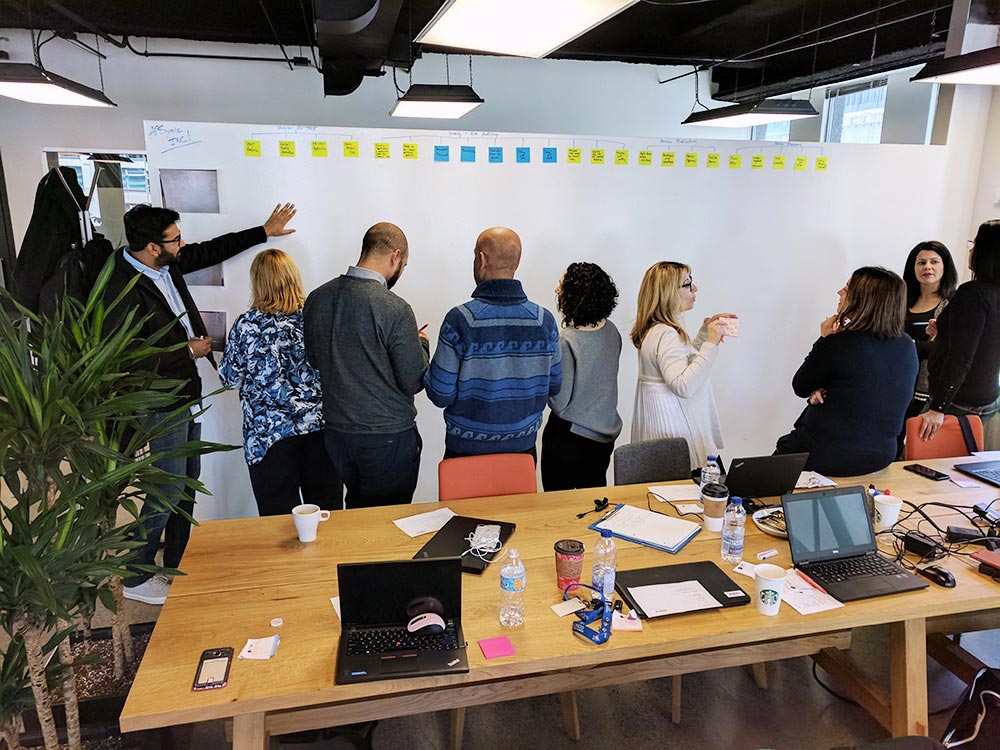
Bernhard Lang, Member of the Board at MSG System, joins us to discuss innovation and blockchain in the insurance industry. In this podcast we discuss the importance for the insurance industry to remain relevant in an ever changing market. How making innovation a corporate discipline and embracing a customer centric approach to remain engaged in customer ecosystems is critical to that objective of relevance.
What is blockchain?
From a non-technical point of view blockchain is a form of digital representation of what we naturally do in real life. We want to be part of social communities within which we communicate, make agreements, state facts, and make promises that are then known to the people within the community as a current status of things or an evolving collective truth.
The technical definition of blockchain is that it’s an immutable and distributed technology that enables the creation of new business scenarios. According to Bernhard, too often blockchain technology is looked at from a technology angle first before a business one. He personally prefers that we start with a business problem and then identify blockchain technology if it is the right one for the business problem.
About MSG
Bernhard Lang has been with MSG for the past 25 years. MSG is a German product based system integrator. MSG focuses on 10 different lines of business. Their business strategy is to develop industry specific content, software assets, software solutions, that go very deep into the lines of business along with a consulting services associated with it. The majority of MSG’s business is within insurance but also looks at other industry verticals such as banking, public sector, automotive and others.
In addition, MSG works with startups such as Ritablock (featured on Insureblocks: Ep. 124 – Reinsurance accounting blockchain, Ritablock integrates with B3i’s Fluidity platform) and they have co-developed the SAP FS-RI (financial services reinsurance), which has become the market standard for professional reinsurance companies and for cedents.
Outside of reinsurance, MSG has partnered with Marco Polo, a trade finance blockchain solution, to help them integrate with SAP European Systems.
Insurers approach to blockchain in comparison to mature platforms like SAP
Bernhard believes the insurance industry is quite open to blockchain technology however he notes that the materialisation of previous blockchain investments haven’t been that great. Consequently he believes that in the future the insurance industry might be more cautious to making investments in blockchain.
MSG has an innovation lab in Canada called Cookhouse Lab. In May 2017, they launched a four week design thinking blockchain workshop along with seven insurance companies where they identified 34 uses cases and created three prototypes. Whilst there was a lot if interest at that time, Bernhard would qualify the output as having had a limited impact and not significant enough to be considered a game changer.
Whilst he believes insurers will keep looking at blockchain technology few will expect high returns.
Evaluating new innovative technologies within the insurance industry
Bernhard candidly describes the decision making process within insurance companies as being sometimes irrational. To support that statement, he recalls a meeting regarding ACORD standards, which in his opinion represent a huge business case. During that meeting, insurance professionals flew in from around the world, agreed to join forces and create a service organisation. All participants were requested to make a €40,000 investment for this initiative. Unfortunately, they had great difficulties in raising that amount of money. Bernhard asks the question that if it was such an obvious use cases with large saving potentials why was it so difficult to raise such a small amount of money?
For Bernhard the insurance industry sometimes makes irrational decisions when it doesn’t go for obvious business cases. He thinks that’s equally true for blockchain. Blockchain can bring great benefits and large saving potential but there’s still some resistance to it. He queries whether the reason blockchain isn’t being fully adopted in the insurance industry is because the industry is doing well enough that it doesn’t need to improve its efficiency.
There is also the case of finding the right top managers within an insurer who has the willingness to take strong decisions.
Bernhard believes blockchain can be a key technology to set up cross industry collaborations. Therefore, he believes that insurance has to collaborate with other industries. Otherwise, he thinks there’s a risk that they are pushed to the second row, and that they lose access to their consumers.
Best practices when evaluating innovative technologies
Bernhard explains how in the past they would receive an RFP, they answered the RFP, they presented their product and if the product was liked it was purchased.
Now he believes that the way of collaboration for new solutions and leveraging new innovative technologies has changed. The whole approach to innovation, open innovation and collaboration in new ecosystems has all changed.
Bernhard believes that now entities need to collaborate at the idea generation, join forces in a co-innovation space where you perform join design thinking sessions and jointly work on the solution. That’s the key to success, to take new fields and leverage digital technologies like blockchain for creating new products and collaborating with customers, partners and subject matter experts from within your industry and outside your industry.
MSG partnered with B3i to create an innovation laboratory for reinsurance solutions
As B3i has a growing community of insurers, MSG believed there was a potential to work with them to understand their needs and work jointly to leverage digital technologies in an innovative environment. MSG comes into the partnership with their reinsurance products and primary insurance products whilst B3i comes with their DLT consortium. They want to connect these two worlds and work jointly on new innovative solutions.
They’ve recently sent out invitations to the market to join MSG and B3i and work jointly on new innovative business ideas, leveraging MSGs products and B3i’s fluidity platform and B3i’s Corda based technology.
Initially working with B3i wasn’t something that MSG had envisioned as their product managers and architects felt that B3i had the potential to disrupt MSG and remove the need for the FS-RI products if everything moved onto blockchain.
However, when they looked at it more closely they realised that if this was to happen it would be much later in the future and in the meantime, there exists many opportunities for the two entities to collaborate together.
It turns out that B3i also initially saw MSG as competitors but both parties now see each other as partners who want to collaborate together to improve the industry.
Changes coming to the insurance industry
Bernhard believes insurance as a service has a great potential. He believes that cross industry platforms that foster cross industry collaboration is the way forward and blockchain is a great technology to support this.
He foresees that we will see more insurance companies partner up with companies from other industries whether it is with Marco Polo or Contour that can expand their products by bundling together insurance to the end customers.
To sum it up Bernhard thinks there is a great potential to bundle insurance as a service in all kinds of cross industry platforms.
Fostering cross industry learnings & remaining relevant
Insurers have to get out of their silos and collaborate with other industries if they still want to main customer relations. They need to understand what is happening in other markets, understand the risk and identify the kind of risk coverage services they can offer. To achieve this you need an ecosystem point of view that is customer centric.
Bernhard reminds us that everybody needs risk transfer but not necessarily from an insurance company. With so much capital in the market, it’s normal that non-traditional risk carriers want to get into that market.
MSGs’ innovation experiences
Bernhard recognises the challenges for a corporate like MSG to successfully perform innovation because of its own corporate culture. As a corporate’s innovation is often stifled by compliance, reporting figures, IT security and other requirements, MSG wanted to have a startup mentality and culture. To reach that objective they took people from the corporate, created an innovation space for them and removed some of the corporate pains by giving them increased freedoms and independence.
Members of the team that work in the innovation lab have some skin in the game and is willing to participate in a risk reward model.
More importantly Bernhard believes that innovation needs to have top management attention and as finance, accounting or controlling, innovation needs to become a corporate discipline in itself.
Figuring out the right approach to installing an innovation culture within a corporate can be a tricky exercise. The Insureblocks team has built over 6 startups and help build 2 innovation labs within large corporates. If you’d like to have a conversation on how to install an innovation culture or innovation lab within your corporate please don’t hesitate to reach out to us on [email protected] or via Linkedin.








